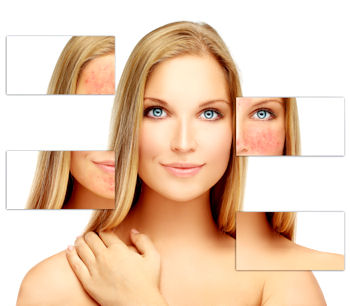 You long for skin that has a natural, healthy glow. Instead, your face seems to be constantly flushed. Sound familiar? If so, you may have a chronic skin problem called rosacea. The good news is that you can tame the redness by lowering your stress level.
You long for skin that has a natural, healthy glow. Instead, your face seems to be constantly flushed. Sound familiar? If so, you may have a chronic skin problem called rosacea. The good news is that you can tame the redness by lowering your stress level.
Some women are puzzled when they look into the mirror and notice for the first time that their cheeks are flushed. They also may have redness or tiny broken blood vessels on their nose, chin, forehead and neck. The cause of their "blush" could be rosacea, a chronic skin disorder that can affect people of all ages and races.
“Rosacea mainly targets fair-skinned people over age 30,” said Jason A. Clark, MD, a board-certified dermatologist and Harvard-trained laser specialist with Carrollton Dermatology and a member of the medical staff at Tanner Health System. “It affects women more often then men, but men are more likely to get severe rosacea.”
Besides a blushed appearance, rosacea can cause bumps, thin red-purple lines and broken blood vessels. The skin may feel dry or tight. Those with severe rosacea may have a large, swollen nose.
“Many rosacea sufferers also experience eye problems,” said Dr. Clark. “For example, they may have gritty, burning, dry eyes or swollen eyelids. Some people get these eye symptoms before they have skin symptoms. Preservative-free artificial tears and warm compresses on the eyes can help ease the discomfort.”
 Researchers aren't certain why up to 10 percent of the population has rosacea, but they do know that some factors are more likely to trigger flare-ups. One of the biggest factors is stress.
Researchers aren't certain why up to 10 percent of the population has rosacea, but they do know that some factors are more likely to trigger flare-ups. One of the biggest factors is stress.
If you have rosacea, stress management strategies may help you avoid outbreaks. Dr. Clark recommended these strategies:
- When you feel tense, take a few deep breaths and picture yourself in a calm setting.
- Try a few gentle stretches.
- Play soft music or read.
- Practice meditation or yoga (but not hot yoga)
“Besides stress, other things can cause flare-ups,” said Dr. Clark. To avoid these triggers, try these tips:
- Watch what you eat. Avoid alcohol, hot drinks, caffeine, citrus fruits and spicy foods.
- If you can, avoid temperature extremes.
- Protect your skin from the sun year-round by covering up and wearing sunscreen with a sunscreen protective factor (SPF) of 30 or higher. Try a sunscreen made for children — it's less likely to irritate your skin.
- Don't use skin care products with alcohol, witch hazel, menthol, acids or fragrances.
- Avoid intense exercise. Choose shorter, more frequent workout sessions that won't make you flushed.
“While treatment cannot cure rosacea, it can make your skin look clearer,” said Dr. Clark. “Treatment may include antibiotic pills or products that you apply to your skin. Other medicines can prevent eye problems from getting worse. Laser and light-based technologies are our newest tools. Laser treatments can be a safe and effective way to eliminate broken blood vessels and improve flushing with minimal downtime.
“Laser safety is paramount,” Dr. Clark added. “Be sure to seek care from a well-trained medical provider.”
To find a dermatology specialist on staff at Tanner Health System, call 770.214.CARE (2273) or choose Find a Doctor.